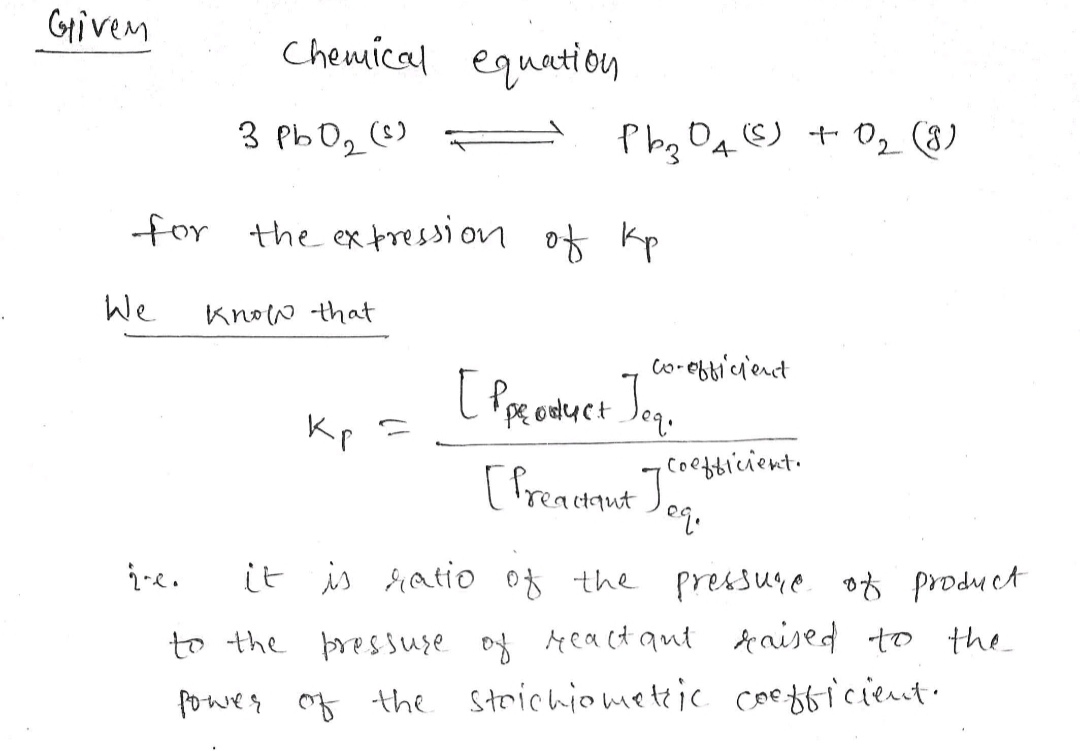eq req req 2req 2req Write the expression for the equilibrium constant K, for the following reaction. as (P Enclose pressures in parentheses and do NOT write the chemical formula as a subscript. For example, enter (PNH₂)² as NH3)². If either the numerator or denominator is 1, please enter 1 Common Greek(upper) Ox 0 0 Undo Redo Clear Help x x, 3 PbO₂ (s) →→→ Pb304(s) + O₂(g) [Review Topics] [References] Use the References to access important values if needed for this question. Submit Answer DIO Greek(lower) Arrows Other Aa (s) (1) (g) (aq) Retry Entire Group 9 more group attempts remaining Previous
eq req req 2req 2req Write the expression for the equilibrium constant K, for the following reaction. as (P Enclose pressures in parentheses and do NOT write the chemical formula as a subscript. For example, enter (PNH₂)² as NH3)². If either the numerator or denominator is 1, please enter 1 Common Greek(upper) Ox 0 0 Undo Redo Clear Help x x, 3 PbO₂ (s) →→→ Pb304(s) + O₂(g) [Review Topics] [References] Use the References to access important values if needed for this question. Submit Answer DIO Greek(lower) Arrows Other Aa (s) (1) (g) (aq) Retry Entire Group 9 more group attempts remaining Previous
Chemistry
10th Edition
ISBN:9781305957404
Author:Steven S. Zumdahl, Susan A. Zumdahl, Donald J. DeCoste
Publisher:Steven S. Zumdahl, Susan A. Zumdahl, Donald J. DeCoste
Chapter1: Chemical Foundations
Section: Chapter Questions
Problem 1RQ: Define and explain the differences between the following terms. a. law and theory b. theory and...
Related questions
Question
![**Title: Calculating the Equilibrium Constant \( K_p \) for a Reaction**
---
**Instructions:**
Write the expression for the equilibrium constant \( K_p \) for the following reaction.
- Enclose pressures in parentheses and do not write the chemical formula as a subscript. For example, enter \( (P_{\text{NH}_3})^2 \) instead of \( P_{\text{NH}_3}^2 \).
- If either the numerator or denominator is 1, please enter 1.
**Chemical Reaction:**
\[ 3 \text{PbO}_2 (s) \rightarrow \text{Pb}_3\text{O}_4 (s) + \text{O}_2 (g) \]
**Input Box:**
There is an input box provided to enter the expression for \( K_p \).
**Symbols Available:**
- Common Symbols: \( x^2, x^3, x_1, x_2 \)
- Greek (Upper): Alpha, Beta, Gamma, etc.
- Greek (Lower): alpha, beta, gamma, etc.
- Arrows: \(\rightarrow, \leftrightarrow\)
- Other: \( (s), (l), (g), (aq) \)
**Options:**
- Submit Answer
- Retry Entire Group
- 9 more group attempts remaining
---
**Guide for Students:**
1. Identify the gaseous components in the reaction as solids and liquids are not included in the expression for \( K_p \).
2. Use the provided symbols to correctly format your answer.
3. Check if the reaction involves only solids, if so, the equilibrium constant, \( K_p \), would be determined by gases present.
In this reaction, since \( \text{O}_2 (g) \) is the only gaseous product, your expression for \( K_p \) will involve only this component.](/v2/_next/image?url=https%3A%2F%2Fcontent.bartleby.com%2Fqna-images%2Fquestion%2F3e5f0bee-bbde-421f-8347-e8b63f453811%2Fb78673ee-5d24-4ba9-b937-78c1404a9cd2%2F3bbm90o_processed.jpeg&w=3840&q=75)
Transcribed Image Text:**Title: Calculating the Equilibrium Constant \( K_p \) for a Reaction**
---
**Instructions:**
Write the expression for the equilibrium constant \( K_p \) for the following reaction.
- Enclose pressures in parentheses and do not write the chemical formula as a subscript. For example, enter \( (P_{\text{NH}_3})^2 \) instead of \( P_{\text{NH}_3}^2 \).
- If either the numerator or denominator is 1, please enter 1.
**Chemical Reaction:**
\[ 3 \text{PbO}_2 (s) \rightarrow \text{Pb}_3\text{O}_4 (s) + \text{O}_2 (g) \]
**Input Box:**
There is an input box provided to enter the expression for \( K_p \).
**Symbols Available:**
- Common Symbols: \( x^2, x^3, x_1, x_2 \)
- Greek (Upper): Alpha, Beta, Gamma, etc.
- Greek (Lower): alpha, beta, gamma, etc.
- Arrows: \(\rightarrow, \leftrightarrow\)
- Other: \( (s), (l), (g), (aq) \)
**Options:**
- Submit Answer
- Retry Entire Group
- 9 more group attempts remaining
---
**Guide for Students:**
1. Identify the gaseous components in the reaction as solids and liquids are not included in the expression for \( K_p \).
2. Use the provided symbols to correctly format your answer.
3. Check if the reaction involves only solids, if so, the equilibrium constant, \( K_p \), would be determined by gases present.
In this reaction, since \( \text{O}_2 (g) \) is the only gaseous product, your expression for \( K_p \) will involve only this component.
Expert Solution
Step 1

Step by step
Solved in 2 steps with 2 images

Knowledge Booster
Learn more about
Need a deep-dive on the concept behind this application? Look no further. Learn more about this topic, chemistry and related others by exploring similar questions and additional content below.Recommended textbooks for you

Chemistry
Chemistry
ISBN:
9781305957404
Author:
Steven S. Zumdahl, Susan A. Zumdahl, Donald J. DeCoste
Publisher:
Cengage Learning

Chemistry
Chemistry
ISBN:
9781259911156
Author:
Raymond Chang Dr., Jason Overby Professor
Publisher:
McGraw-Hill Education

Principles of Instrumental Analysis
Chemistry
ISBN:
9781305577213
Author:
Douglas A. Skoog, F. James Holler, Stanley R. Crouch
Publisher:
Cengage Learning

Chemistry
Chemistry
ISBN:
9781305957404
Author:
Steven S. Zumdahl, Susan A. Zumdahl, Donald J. DeCoste
Publisher:
Cengage Learning

Chemistry
Chemistry
ISBN:
9781259911156
Author:
Raymond Chang Dr., Jason Overby Professor
Publisher:
McGraw-Hill Education

Principles of Instrumental Analysis
Chemistry
ISBN:
9781305577213
Author:
Douglas A. Skoog, F. James Holler, Stanley R. Crouch
Publisher:
Cengage Learning

Organic Chemistry
Chemistry
ISBN:
9780078021558
Author:
Janice Gorzynski Smith Dr.
Publisher:
McGraw-Hill Education

Chemistry: Principles and Reactions
Chemistry
ISBN:
9781305079373
Author:
William L. Masterton, Cecile N. Hurley
Publisher:
Cengage Learning

Elementary Principles of Chemical Processes, Bind…
Chemistry
ISBN:
9781118431221
Author:
Richard M. Felder, Ronald W. Rousseau, Lisa G. Bullard
Publisher:
WILEY